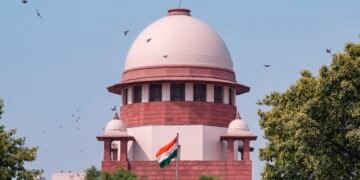During the announcement of the upcoming Lok Sabha election schedule on March 16th, Chief Election Commissioner Rajiv Kumar staunchly defended the reliability and integrity of Electronic Voting Machines (EVMs). These specialised devices, comprising a ballot unit, control unit, and the recently added Voter Verifiable Paper Audit Trail (VVPAT), are meticulously designed, manufactured, and employed according to established election procedures and regulations. The VVPAT component plays a crucial role in addressing potential doubts surrounding the free and fair conduct of elections in India.
However, the Election Commission appears resolute in its stance, dismissing any skepticism concerning the trustworthiness of EVMs. The Commission maintains that EVMs enhance the electoral process, rendering it more equitable, efficient, and expeditious, without necessarily relying on VVPAT slips. Despite the intended purpose of the VVPAT as a safeguard against irregularities, the Election Commission seems unwavering in its conviction that EVMs, in and of themselves, are sufficient to ensure the integrity of the electoral process.
The Chief Election Commissioner’s response to concerns about the reliability of Electronic Voting Machines (EVMs) was dismissive and deflective. Instead of addressing the legitimate concerns raised by a significant portion of the electorate, he chose to vouch for the fairness and integrity of the machines without providing any tangible evidence or addressing the specific allegations.
In a misguided attempt to deflect criticism, the CEC shared an Urdu couplet he had composed, which essentially blamed the doubters for their “unfulfilled desires” and accused them of failing to “prove themselves.” The poetic response, when roughly translated, conveyed the message: “It is not right to blame us every time for unfulfilled desires. While you fail to prove yourself, you say it is the fault of the EVM.” This poetic dismissal of allegations and shifting of blame onto the electorate is a concerning approach from the very authority responsible for conducting free and fair elections.
Dismissing concerns about potential EVM malfeasance by attributing them to “unfulfilled desires” does nothing to address the underlying issues or restore confidence in the electoral process. Moreover, the CEC’s response fails to acknowledge the Election Commission of India’s (ECI) responsibility to conduct elections in a transparent and accountable manner.
Rather than deflecting criticism with poetic language, the ECI should be actively working to address concerns, investigate allegations thoroughly, and implement measures to ensure the integrity of the voting process. Ultimately, the CEC’s response falls short of addressing the core issue: the need for a reliable, trustworthy, and transparent electoral system that inspires confidence in the electorate. Dismissive attitudes and poetic deflections only serve to further erode public trust in the democratic process.
While the EC asserts that EVMs are tamper-proof and cannot be compromised, those advocating for free and fair elections, including voters, political parties, and EVM experts, have repeatedly and unequivocally expressed reservations about the reliability of these machines due to the absence of transparency. The EC’s insistence that doubts are unfounded without providing convincing proof only fuels further suspicion, akin to dismissing questions about the Niti Aayog’s highly contentious figures on poverty reduction in India, which claim that only 11 per cent of the population lives below the poverty line and that 25 crore people have escaped poverty in the last nine years. In the absence of transparency, it becomes increasingly difficult to trust the EC’s assertion that the entire electoral process, including EVMs and the electronic and technological components, is error-free. Skepticism arises when claims of infallibility are made without substantive evidence or opportunities for independent verification.
Despite the Election Commission’s assertions that there is no room for misrepresenting the electorate’s choice and that concerns about Electronic Voting Machines (EVMs) are unfounded, doubts persist due to various reasons. For instance, a comprehensive analysis by The Quint of two sets of data provided by the EC – voter turnout/votes polled data on EVMs and the votes counted on EVMs – in the 373 constituencies that went to polls in the first four phases of the 2019 general election revealed serious discrepancies.
By dismissing democratic voices, ridiculing political parties and EVM experts, and claiming that EVMs have made the electoral process fairer and better, the Chief Election Commissioner and the EC have failed to address the concerns raised by many regarding the free and fair conduct of elections. If suspicions arise and aspersions are cast after every election, it is the EC’s responsibility to dispel the trust deficit over the electoral process.
The statement made by the CECs (Chief Election Commissioners) that only those who lose elections raise questions over the reliability of EVMs (Electronic Voting Machines) is problematic and reflects a concerning mindset. This assertion implies two flawed assumptions: (1) It dismisses legitimate concerns as mere excuses or sour grapes from losers, failing to acknowledge the importance of addressing doubts over the integrity of the electoral process, which is crucial for maintaining public trust and confidence in democracy. (2) It suggests that elections are solely for political parties and candidates, overlooking the fundamental principle that in a true democracy, sovereignty resides with the citizens, and elections are the means by which citizens exercise their right to choose their representatives.
These assumptions are inherently false and undermine the very essence of a democratic system. In a vibrant democracy, the electoral process must uphold the highest standards of transparency, fairness, and accountability. The voting system, which is the cornerstone of this process, must not only be free and fair but must also be perceived as such by the electorate.
Dismissing concerns over the reliability of EVMs or any aspect of the electoral process as mere excuses from disgruntled losers is antithetical to the principles of democracy. It is imperative that all stakeholders, including political parties, candidates, and most importantly, citizens, have unwavering confidence in the integrity of the electoral system. Only then can the true spirit of democracy be upheld, where the will of the people is reflected accurately and without any shadow of doubt.
Transparency in the voting process is paramount to ensure voters’ confidence that their ballot is accurately recorded and tallied. The systems used for voting and counting must provide voters with the assurance that their choice is cast as intended, documented as cast, and counted as recorded. However, the Election Commission’s vetting of Electronic Voting Machines (EVMs) has failed to inspire trust for two key reasons. Firstly, the EC has not taken sufficient measures to dispel suspicions that these machines can be compromised or unduly influenced.
Secondly, the EC’s credibility in the eyes of voters and the political opposition has plummeted due to various factors. One such factor is the perceived bias in enforcing the model code of conduct, with allegations of unequal treatment of political parties and candidates. Another cause for concern is the seemingly partisan manner in which the Chief Election Commissioner and other election commissioners are being selected. In essence, while voting integrity hinges on transparency, the EC’s handling of EVMs and perceived partiality have eroded public faith in the electoral process’s fairness and impartiality.
While there is no concrete proof that Electronic Voting Machines (EVMs) are susceptible to manipulation or can be exploited to manufacture votes in favor of a particular political party, the mere theoretical possibility of compromise cannot be disregarded. The lack of evidence does not necessarily constitute evidence of absence, as experts in the field caution. In a scenario where one party holds a dominant position in the electoral process, exerting control over institutions and resources, it is understandable that questions and doubts arise concerning the integrity of the voting system.
The primary concern among voters and opposition parties revolves around the accurate recording of their ballots. This apprehension can be alleviated through a straightforward solution: presenting voters with a tangible proof of their vote, in the form of a Voter-Verifiable Paper Audit Trail (VVPAT) slip, which they can visually verify and deposit into a separate receptacle. This physical record would serve as a secondary source of truth, complementing the data stored in the EVMs, thereby enhancing the transparency and credibility of the electoral process.
The forthcoming elections will witness a new process aimed at enhancing transparency and instilling greater confidence in the electoral system. While voters will continue to exercise their franchise through electronic voting machines (EVMs), they will now receive a printed VVPAT (Voter Verifiable Paper Audit Trail) slip as a physical record of their vote. After verifying that the VVPAT slip accurately reflects their choice, voters will deposit these slips into designated boxes. This dual mechanism ensures that votes are documented both electronically (in the EVM) and physically (through VVPAT slips).
Prior to the declaration of results, authorities will conduct a comprehensive tally and cross-verification of the data from both sources, ensuring their concordance. This proposal, championed by the INDIA alliance during their December 2023 meeting, aligns with a petition filed in the Supreme Court, prompting the Election Commission to take cognizance on April 1. While the physical counting of VVPAT slips may lead to a slight delay in announcing the results, the staggered nature of the elections, spanning seven phases over a month and a half, should mitigate any significant impact. Ultimately, the additional time invested in this process is a small price to pay for upholding the integrity and credibility of the electoral process.
(The writer can be reached at dipakkurmiglpltd@gmail.com)


























